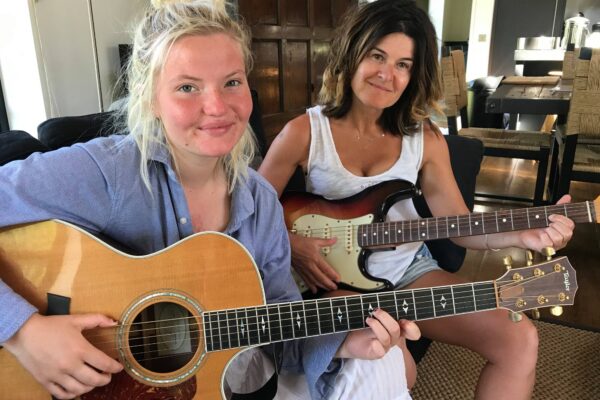
The Best Way to Learn to Play Guitar
The Best Way to Learn to Play Guitar
Learning to play the guitar is a journey that can be incredibly rewarding, but it requires patience, dedication, and the right guidance. Whether you’re an aspiring guitarist or a seasoned player looking to share your knowledge, understanding how to teach guitar effectively is crucial. This comprehensive guide will explore the best ways to learn and teach guitar, focusing on essential beginner topics, the role of empathy, and strategies for teaching both in-person and online.
How to Start Teaching Guitar Lessons
Teaching guitar begins with a solid plan and structure. Here are some steps to get you started:
- Assess Your Skill Level: Ensure you have a thorough understanding of guitar playing and theory. This foundation is crucial for effectively teaching others.
- Set Clear Goals: Define what you want to achieve with your students. Goals can range from learning basic chords to mastering advanced techniques.
- Create a Curriculum: Develop a structured lesson plan that gradually introduces new concepts. A well-thought-out curriculum helps students build their skills progressively.
- Gather Teaching Materials: Prepare resources such as chord charts, scales, tablature, and backing tracks. These tools aid in teaching and make learning more interactive.
- Establish a Teaching Environment: Whether teaching in-person or online, ensure your environment is conducive to learning. This includes a quiet space, good lighting, and all necessary equipment.
How to Teach Guitar: The Role of Empathy
Empathy is a key component of effective teaching. Understanding your students’ perspectives and challenges can significantly enhance their learning experience.
- Listen Actively: Pay attention to your students’ concerns and struggles. Address their questions and provide constructive feedback.
- Be Patient: Learning guitar can be frustrating. Encourage your students to take their time and celebrate small victories.
- Adapt Your Teaching Style: Different students have different learning styles. Be flexible and adjust your approach to meet individual needs.
- Encourage Expression: Allow students to explore their creativity. Encourage them to write their own music or improvise.
Essential List of Beginner Topics for Guitarists
When teaching beginners, it’s important to cover fundamental topics that provide a strong foundation. Here are essential topics to include:
- Parts of the Guitar: Familiarize students with the anatomy of the guitar, including the fretboard, strings, and tuning pegs.
- Tuning the Guitar: Teach students how to tune their guitar using a tuner or by ear.
- Basic Chords: Start with open chords like C, G, D, E, and A. These are the building blocks for many songs.
- Strumming Patterns: Introduce simple strumming patterns to help students develop rhythm and timing.
- Reading Tablature: Teach students how to read guitar tabs, a common way of notating music for guitar.
- Basic Scales: Begin with the pentatonic scale, which is widely used in many genres.
- Finger Exercises: Incorporate exercises to build finger strength and dexterity.
- Simple Songs: Start with easy songs that use basic chords. This helps students apply what they’ve learned in a musical context.
The First Thing to Learn as a Beginner on the Guitar
The first thing a beginner should learn is how to properly hold and tune the guitar. Without a correctly tuned guitar, even the best techniques will sound off.
- Holding the Guitar: Ensure students know how to hold the guitar comfortably. This includes positioning the guitar on their lap and supporting the neck with their fretting hand.
- Tuning the Guitar: Teach them how to use a tuner to get each string to the correct pitch. Proper tuning is essential for playing in key and sounding good.
Learn to Teach Guitar: How to Become a Guitar Teacher
Becoming a guitar teacher involves more than just playing well. Here are steps to develop your teaching career:
- Gain Experience: Start by teaching friends or family to gain confidence and experience.
- Seek Certification: Consider certification programs that provide formal teaching credentials.
- Build a Portfolio: Create a collection of your work, including lesson plans and student testimonials.
- Market Yourself: Use social media, local ads, and music schools to promote your teaching services.
- Continual Learning: Stay updated with new teaching methods and guitar techniques. Attend workshops and masterclasses to enhance your skills.
How to Teach Guitar Online
Teaching guitar online has become increasingly popular. Here are some tips to succeed in the digital space:
- Choose the Right Platform: Use platforms like Zoom, Skype, or dedicated teaching sites to conduct lessons.
- Invest in Quality Equipment: Ensure you have a good webcam, microphone, and stable internet connection to provide a professional experience.
- Create Digital Resources: Develop online materials such as video tutorials, PDFs, and backing tracks that students can access anytime.
- Engage with Students: Use interactive tools like screen sharing and virtual whiteboards to enhance learning.
- Build an Online Presence: Use social media and YouTube to showcase your teaching style and attract new students.
The Best Way to Learn to Play Guitar: 20 Tips
- Set Realistic Goals: Break down your learning into manageable steps.
- Practice Regularly: Consistency is key. Aim for daily practice, even if it’s just 10-15 minutes.
- Use a Metronome: This helps develop your timing and rhythm.
- Start Slow: Focus on playing accurately before increasing speed.
- Learn Songs You Love: Playing music you enjoy keeps you motivated.
- Record Yourself: Listening to recordings of your playing can help you identify areas for improvement.
- Play with Others: Jamming with other musicians improves your timing and adaptability.
- Take Breaks: Avoid burnout by taking regular breaks during practice sessions.
- Experiment with Genres: Explore different styles to become a versatile player.
- Use Online Resources: Platforms like YouTube and guitar forums offer valuable lessons and tips.
- Stay Patient: Progress can be slow. Celebrate small victories along the way.
- Focus on Technique: Proper technique prevents bad habits and injuries.
- Join a Community: Being part of a guitar community can provide support and inspiration.
- Attend Workshops: Learning from different teachers broadens your perspective.
- Keep Your Guitar in Tune: Regular tuning ensures your practice sounds good and is effective.
- Develop Ear Training: Being able to play by ear is a valuable skill.
- Maintain Your Guitar: Regular maintenance, like changing strings, keeps your instrument in top condition.
- Set Challenges: Push yourself with new techniques or difficult songs.
- Seek Feedback: Constructive criticism from teachers or peers can guide your improvement.
- Enjoy the Journey: Remember why you started and keep the joy of playing at the forefront.
Learning and teaching guitar is a dynamic and rewarding process. By following these structured approaches and tips, you can make significant progress as a guitarist or an instructor, inspiring others along the way.
Learn How to Play Guitar Online: Step-by-Step Guide
Here’s a step-by-step guide to help you start learning guitar online effectively:
- Set Up Your Workspace: Create a comfortable and distraction-free practice area. Ensure good lighting and have all your materials within reach.
- Learn Guitar Anatomy and Tuning: Familiarize yourself with the parts of the guitar and learn how to tune it properly. This is fundamental to producing good sound.
- Start with Basic Chords and Strumming: Begin with essential open chords (C, G, D, E, A) and simple strumming patterns. Practice switching between chords smoothly.
- Practice Finger Exercises: Build finger strength and dexterity with exercises like chromatic scales and simple melodies.
- Learn to Read Tablature and Chord Charts: Understanding these notations will allow you to learn songs more easily.
- Play Simple Songs: Apply what you’ve learned by playing easy songs. This reinforces your skills and keeps you motivated.
- Incorporate Scales and Basic Theory: Start with the pentatonic scale and learn basic music theory concepts to understand how music works.
- Use Backing Tracks: Practice playing along with backing tracks to improve your timing and rhythm.
- Record and Review: Record your practice sessions to track your progress and identify areas for improvement.
- Seek Feedback: Share your recordings with online communities or teachers to receive constructive feedback.
20 Tips for Learning Guitar Online
- Set achievable short-term and long-term goals.
- Stay consistent with your practice routine.
- Break practice sessions into focused segments (chords, scales, songs).
- Use a metronome to develop your sense of timing.
- Start slow and gradually increase your playing speed.
- Learn songs that inspire you to keep practicing.
- Practice playing both with and without a pick.
- Use online resources like chord libraries and scale diagrams.
- Join online guitar communities for support and advice.
- Record your practice sessions to monitor progress.
- Play along with your favorite songs to develop your ear.
- Use backing tracks to practice improvisation.
- Experiment with different genres to expand your skills.
- Take breaks to avoid burnout and maintain motivation.
- Focus on proper finger positioning to avoid bad habits.
- Watch live performances of your favorite guitarists for inspiration.
- Invest in a good quality guitar and accessories.
- Learn to read music or tablature to access more songs.
- Practice both rhythm and lead guitar techniques.
- Stay patient and enjoy the learning process.
Inspirational Guidance for Guitar Learners
Learning guitar is more than just acquiring a new skill; it’s a journey of self-expression and personal growth. Here are some words of inspiration to keep you motivated:
- Embrace the Journey: Progress may be slow at times, but every small step counts. Enjoy the process of learning and improving.
- Stay Curious: Explore different styles, techniques, and genres. Guitar playing is a lifelong journey of discovery.
- Connect Emotionally: Music is a powerful form of expression. Let your emotions guide your playing and connect with the music on a deeper level.
- Persevere Through Challenges: Difficulties are part of the learning process. Overcoming them will make you a stronger and more confident player.
- Celebrate Your Progress: Take pride in your achievements, no matter how small. Each milestone is a testament to your hard work and dedication.
- Find Your Voice: As you develop your skills, you’ll start to find your unique style and sound. Embrace it and let it shine through your playing.
- Stay Inspired: Surround yourself with music and guitarists that inspire you. Their passion and creativity can fuel your own.
- Share Your Music: Playing guitar is a gift. Share your music with others, whether through performances, recordings, or teaching.
Learning to play guitar online is an exciting and fulfilling endeavor. By following these steps and tips, you can make steady progress and find joy in every strum, chord, and melody. Embrace the journey, stay inspired, and let your guitar playing be a source of endless creativity and expression.







